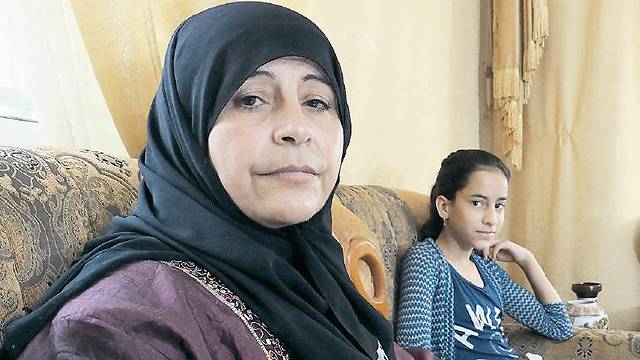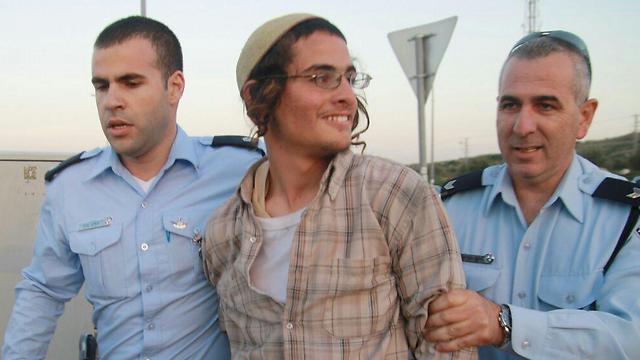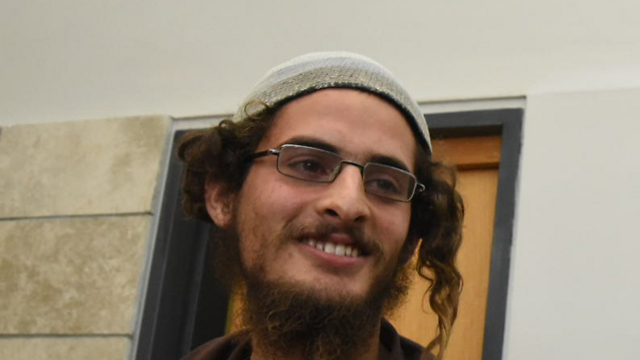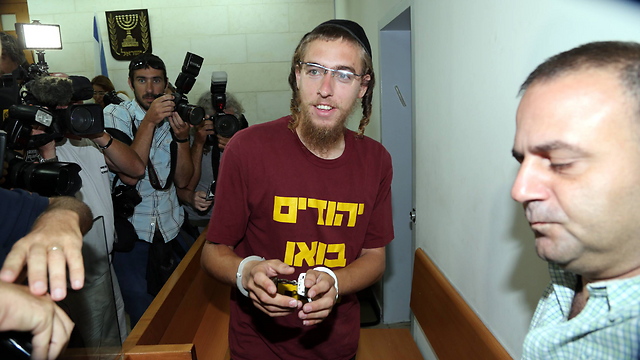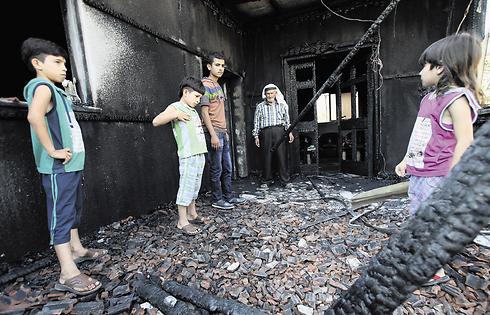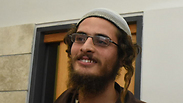
West Bank inches closer to boiling point
The rising tensions are evident everywhere. In Meir Ettinger's fanaticism; in Palestinian villages where night watchmen groups are formed; in Givat Ronen outpost where 'the most hotheaded guys are drawn,' and in the police, where investigators are trying to solve the arson in Duma and prepare for possible Jewish retaliation.
Huda Kumail was very emotional as she led us to the door that saved her life and the life of her daughters. Nine months have passed since that night. The house has been renovated since, the soot and the traces of the fire have been erased, the hateful graffiti cleaned from the wall. And only the trauma, the heart that beats fast, and the anxiety pills that accompany Kumail everywhere in a white nylon bag, are left as evidence.
Kumail lives in a stone house with a fig tree in the yard, rich with fruit, at the northwest end of the village where she was born, Khirbet Abu Falah. There are two more houses nearby, but they are not populated. She's 54 years old and a widow, a mother of seven children, most of which have married and left home, while three daughters still live with her.
It was raining that night and a small light came from Kumail's house. "I woke up because of noise in the yard," she says, and even though the house is cool and the fan is pointed in her direction, she starts sweating.
"I woke the girls up because I thought it's burglars, but we didn't see anything. We went back to bed to sleep, but several minutes later I heard noise again. All of a sudden, I heard blows on the window and front door. I yelled 'who's there?' and no one answered. I ran to the girls and woke them up again and we went to the living room to lock the door separating us and the porch. We heard the sound of breaking glass and started panicking. I thought it might be the army and I yelled 'who is it? Who is it?' but no one answered.
"We ran inside the room. I turned off the electricity and it became dark. They tried to break the living room's iron door and we started crying. We were terrified. We heard people talking in Hebrew but we couldn't understand a word because we don't understand Hebrew. We cried for help and suffocating black smoke started coming from the entrance. My daughter called the neighbors and one of them came running, yelling to us that the Jews escaped, and that he was calling the Fire Department. I was so stressed I didn't know what to do. We started coughing and then I remembered there is a door in the kitchen that leads outside. We went out with shirts covering our faces. Follow me, here in the kitchen, do you see the door? This is the door we used to escape the burning house."
Photos taken after the fire was put out show only soot and destruction. The fire got hold of every part of the porch, including the walls and flooring, and it was fortunate it did not spread into the house.
The army and Israel Police files list the date of the arson: November 23, 2014. Three months later, in early March, Meir Ettinger was arrested at the Sha'ar Binyamin Industrial Zone by detectives from the nationalistic crime unit in the police's Judea and Samaria district.
The official reason was that he was suspected of being involved in the arson at the Kumail family home in Khirbet Abu Falah, and he was taken for questioning at the Ma'ale Adumim police station. There was no evidence against him, only intelligence. At the end of the short interrogation, during which he was asked questions but refused to answer, he received an administrative restraining order barring him from Judea and Samaria and Jerusalem.
What differentiate the arson in Khirbet Abu Falah and the horrifying results of the arson at the Dawabsheh family home in Duma last Friday is a back door and the fact the arsonists made noise in the yard. The murder of baby Ali and his father Saed and the critical wounding of his mother and big brother were just the latest in a series of many other cases of arson at Palestinian homes, which only miraculously ended without casualties.
This week, as we followed in the footsteps of the attack in Duma, we also visited the home of Khaled Dar-Khalil from the village of Sinjil north of Ramallah, which was also set on fire a year and a half ago.
Dar-Khalil told us about the minutes of horror he, his wife, and their five children endured until they were rescued from the burning house by Palestinian firefighters from Birzeit. After that night, Dar-Khalil erected a high iron fence that makes the house look like a cage. Abed, his youngest son, barely four years old, who suffered paralyzing fear that night, became mute.
Kumail's daughters from Khirbet Abu Falah haven't quite returned to their former selves either. They have a hard time falling asleep, fearing the settlers will try to set their homes on fire again.
Restraining orders are not deterrence
Ettinger, who was arrested again this week, was defined by the media as "the Shin Bet Jewish division's number one target." This is an exaggerated definition, as the Shin Bet and the nationalistic crime unit at the police's Judea and Samaria division do not rank their targets. Every person suspected of terror activity is under surveillance and receives attention based on the accumulating intelligence about him.
Ettinger got a little more attention due to the fact that despite his relatively young age, he is well-known to police and the Shin Bet from his activities in outposts across Judea and Samaria. The things he posts on "HaKol HaYehudi" (The Jewish Voice) website against law enforcement authorities and the "idol worship" in Israel - churches and other gentile prayer houses - made him a central target the Shin Bet wants to keep an eye on.
Ettinger is a resident of Jerusalem, 23 years old, the son of Tova, who is the daughter of Rabbi Meir Kahane who founded the "Kach" movement, and Mordechai, a rabbi at the Jerusalem yeshivot of Har Hamor and Ateret Cohanim. Ettinger is married to Moriah, from the settlement of Shiloh. Mordechai, the father, has been trying to convince his son to leave the fundamentalist right-wing circles for years now, without success.
Ettinger has been known to police for six years from his activities in the Ramat Migron outpost in the Binyamin region, which attracted the radical core of the hilltop youth to him. Ettinger himself has committed violent "price tag" attacks in Palestinian villages. One time, he and his friends were caught by the residents of Qusra, who beat them to a pulp. The only reason they were not lynched was because the village's elders protected them from the wrath of the youth.
A security official in the West Bank said Ettinger quickly rose to dominance. "In one incident, we were watching him while he attacked an Arab shepherd’s flock of sheep. He stoned one sheep, and then slaughtered it right in front of the shepherd. It was terrifying, he was possessed with some sort of madness. That is when we realized that he was very active and very radical."
Ettinger always speaks to police with blatant contempt and violently resists arrests.
He was also arrested in the "spy affair," when five youth from the Samaria region were accused of setting up an "operations room" in an apartment in Jerusalem, from which they monitored IDF movements in the territories and warned settlers in the outposts of impending evacuations. He was convicted of "conspiracy to collect information of military value" and sentenced to six months served. From the Binyamin area, he moved to the Nablus area, to the Givat Ronen outpost near Har Brakha.
Yinon Reuveni, 20, originally from Ofakim, who was indicted this week for the arson at the Church of Multiplicity in Tiberias, met Ettinger in Ramat Migron. In the years that have passed since, the two bounced from one outpost to the next. Reuveni moved to the Mishkenos HoRoim outpost near Kokhav HaShahar, a place populated mostly by minors who live in the area like Bedouin.
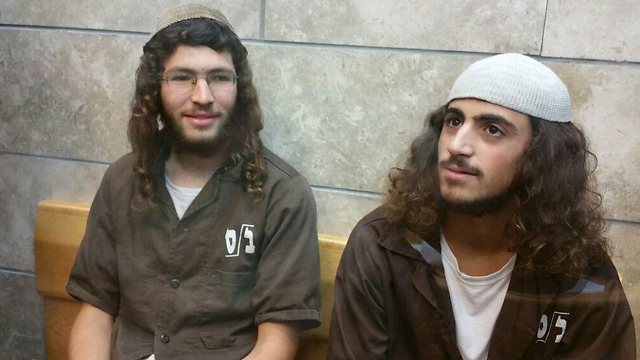
Moshe Orbach, who was charged with incitement to terrorism for writing "The Guide to Committing Price Tag Attacks," also bounced around these outposts. He was slapped with a restraining order earlier this year barring him from entering the West Bank or Jerusalem, and was arrested last year in his parents' house in Bnei Brak.
Up until about a year ago, the residents of the outposts would get into violent clashes with the residents of the nearby Palestinian village of Burin. The situation has calmed down since, but the tensions remain. Most of the violence is instigated by the teenagers attracted to the area, and not the family men who live there.
The view from Givat Ronen is spectacular. The outpost sits on a mountain range in southern Nablus, over the village of Burin, and overlooks Huwwara and the road that leads to Nablus. When we went to visit it this week, we noticed an upswing in construction and development.
Givat Ronen was founded 16 years ago by the hilltop youth of the late 90s. These young men grew up in Kedumim, Shiloh and Kiryat Arba and were fed up with the bourgeoisie lifestyle in the established settlements. This is the generation that founded the outposts in the Shiloh Valley, Adei Ad, Esh Kodesh and Ahiya near the villages of Duma and Turmus Ayya, Migron near Beit El, and Givat Ronen over Nablus.
One of the residents of the area agreed to tell us only this: "The majority here are family men, working people, who teach their children about Judaism, Zionism and service in the IDF. Youth from all across the country come here because this place is in conflict with the state and they are also in conflict with it. They don't agree with the state's policies."
We talked about the attack in Duma, the murder of the baby and his father and the serious wounding of his mother and big brother. "I don't think the people who did this wanted to murder. I think they too were alarmed by the results. If they asked me beforehand, I'd say, 'Don't do it.' As a parent I hurt for the loss of children, doesn't matter if they're Arab or Jewish. But how many Arab and Jewish babies were murdered since Oslo? There's hypocrisy in the public discourse, and I say this as someone who objects to what happened in Duma.
"The most hotheaded guys are drawn here. These guys come to us and we try to calm them down. A Molotov cocktail can't solve problems. But you have to understand that the government creates more and more of these guys because it doesn't give legitimacy to their frustration, their pain over the powerlessness of the state in dealing with Arab terrorism. They don't talk to them at all. The state talks to them only through administrative restraining orders and ankle monitors, and they are not deterred by it. In their mind, they are heroes, they boast 'I got six months.'"
'The 'caliphates' are fighting us'
After the state issued an administrative restraining order against Ettinger in March, attorney Adi Kedar from Honenu appealed the order to the High Court of Justice. Eventually, the appeal was rejected and the order remained in place, but even before the judges made their decision, they received a letter from Ettinger.
"Two weeks ago, I received a restraining order barring me from my home in Givat Sneh Ya'akov near the holy city of Nablus. This order forces me to leave my home, the righteous Jacob's land, my parents’ house in the holy city of Jerusalem, the city of the Temple, and my in-laws' house in Shiloh, where the Tabernacle resided thousands of years before the strange and bizarre laws that this court adheres to were made," he wrote.
"Unfortunately, the Land of Israel is dominated by a government that is not loyal to the laws of Torah and the commandments, to whom the sanctity of the Land of Israel is foreign, and the fact it is called a Jewish state is merely lip service. This is the situation that brought me to stand here, in front of this court, that in my eyes is the same as those who are barring me from my home and the land of my ancestors, whose goal is to promote assimilation and erase the unique nature of the people of Israel, and to whom the state's security is not the same as the security of Jews...
"This court calls itself a high court of justice, but to us it is the symbol of the injustice and the theft of the name 'Israel'... the order I received cites 'reasons of state security and public safety.' This is the time to say - it is not I who destroyed Israel, but you who sit here, and your predecessors, who endanger the Jews' security over and over again..."
Three days after receiving the restraining order, Ettinger gave an interview to "HaKol HaYehudi" website.
"I didn't get this order because I'm suspected of murder or robbing banks, but because we all want to see the Kingdom of Israel rise here as soon as possible," he said, and then elaborated: "We don't recognize the authority of the government that controls the Land of Israel today, to tell us what to do and how to do it... We shouldn't even pay heed to the persecution and the restrictions they put on us. We must act with all of our might to change the situation and do everything we can to form the Kingdom of Israel."
When the order went into effect in the middle of March, Ettinger and his wife Moriah moved to Yad Binyamin near Gedera, and then moved in with relatives in Petah Tikvah. Two weeks after the order went into effect, he was already living in Safed, where he was barred from leaving the house at nighttime and was required to present himself to the police station once a week. He was also barred from communicating with six of his friends. Several months later, three more friends were added to the list.
One of those friends Ettinger was barred from contacting is Efi Haikin from Yitzhar, another one of those involved in the "spy affair." For his part in that affair, Haikin was sentenced to three months in prison, after he expressed remorse and even stated in court that he was no longer interested in living a lifestyle "that advocates the sacrifice of his own life for the sake of an ideological struggle, and was interested in starting a family and leading a normative life."
Ideologically, however, Haikin remained the same. In an interview to "HaKol HaYehudi," he said Ettinger should see his restraining order as a compliment and "as a sign that we are on the right path. It just shows we're heading the way we want to and the evidence to that is that the 'caliphates' are fighting us with vigor."
He defined Ettinger as "the flag bearer of those who believe that the State of Israel should disappear and that we need to establish the Kingdom of Israel as soon as possible, as God commanded us."
Later, Haikin touched upon one of the key points in the ideology that leads the extremists in the outposts: "The State of Israel is financing churches in the Land of Israel even though one of the main commandments given to the people of Israel as they entered the Land of Israel is to uproot any idol worship."
Three months later, in the middle of June 2015, the Church of Multiplication in the northern Kinneret was set on fire. "Completely cut off all false gods" was written on the wall of the church.
Brigade commander is not welcomed
After we left the house in Khirbet Abu Falah, we headed to Mughayir to meet with Adnan Naasan. Naasan is a farmer. Some of his lands are in the northeastern part of the village, near the Adei Ad outpost.
"I'm suffering from the settlers, and I'm not the only one," he told us. "They harass and hurt all of the farmers in the village. They uproot trees, burn agricultural machinery, attack us in the fields."
We drove on a dirt road leading to an agricultural field, and from there to the hill atop which Adei Ad is located. The same road, by the way, also leads to the home of Mrs. Kumail from Khirbet Abu Falah, 2.5 kilometers away from here.
On the edges of the Palestinian field we found a small military tent with four soldiers observing the outpost. They were stationed there to separate the two sides.
On the opposite ridge there was a group of teens and children who noticed us standing there and looking at them. They instantly covered their faces and started making their way down the ridge towards us. But the soldiers assured us we had nothing to worry about, they will protect us. The Palestinian who was with us was not assured by this. We left.
The murder in Duma and the lack of security the Palestinians feel led the governor of Bethlehem, Jibrin al-Bakri, to announce the establishment of popular committees. This is the Palestinian version of "HaShomer" - civilian guards securing the villages that are not protected by the Palestinian police, meaning in Areas B and C that are under Israeli military control.
Bakri, a former senior officer in the Palestinian security forces and the governor of Nablus until a year and a half ago, says there is an increase in acts of violence committed by the settlers against Palestinians and their property.
"I issued a memo to all of the village councils in the district and instructed them to form committees with women, men and teens that will operate at night to protect the villages from any kind of aggression," he said.
The committees currently being established with the backing of the Palestinian Authority are not a new idea. Similar committees have been formed in the past in response to the increase in hate crimes, operating mostly in the Nablus area. The members of these committees went on stakeouts at night and guarded the entrances to the villages, to keep away settlers trying to harm people or destroy property. Except that back then, these units of volunteers were spontaneous, local organizations, which did not have the support of the Palestinian Authority, and lasted a very short time.
Bakri explains that the purpose of the new committees is completely different. "I don't plan on having groups patrolling the villages at night, but instead every night there will be watchmen who stay awake in their homes and the entire village will have their phone number. They will immediately receive any updates or complaint on suspicious settlers entering the village, and their job will be to wake up the village using the loudspeakers in mosques and call for help from the Palestinian District Coordination and Liaison Administration," he said. "They committees are not there to hurt anyone, but we will not allow anyone to hurt Palestinians inside their villages. The idea is defense rather than offense."
When the situation is explosive and the winds are fanning the flames, the police and the Shin Bet understand the importance of finding the perpetrators of the arson and murder in Duma.
Police chief superintendent Udi Levy, the head of the Nationalistic Crimes Unit at the Judea and Samaria District, said that he and his men have been investigating the case non-stop since early Friday morning last week when the arson occurred, "And I can tell you we are investing all of our resources and efforts into this investigation."
Are you optimistic that this time you will catch the perpetrators?
"I can say we will make every effort."
Do your assessments point to this being a revenge attack for the murder of Malachi Rosenfeld, which happened near the village?
"We're looking into several motives. It's not necessarily revenge for Rosenfeld's murder only because of the physical proximity to the place. It could also be revenge for the incidents in Beit El, maybe someone was bothered by the destruction of the buildings there, and maybe it's a response to the indictment filed last week in the case of the arson of the Church of Multiplication. With the church, we knew there was an agenda against Christian prayer houses in Israel and we knew who was leading that agenda. In Duma, the motives could come from several different places."
Levy says there is actually a decline in the number of nationalistically-motivated violent acts against Palestinians. "Over the last year, we've put a lot of pressure and took care of the problematic core in Hebron, Bat Ayin, the group that was going around the Samaria, mostly in Yitzhar," he says. Things calmed down in these areas. We are left with one area, which is the most significant in Judea and Samaria, the Shiloh group. There's nothing beyond that."
Who is leading them?
"They have no rabbinical authority. These guys are of the opinion the rabbis have become moderate, that they are groveling to the state, and if there is any authority, it's guys from among them. Guys like Ettinger, Yinon Reuveni, Moshe Orbach. Guys who don't study. All of the official bodies tried to deal with them, offer help - the welfare services, the council - nothing worked. Even the army. The Commander of the Binyamin Regional Brigade, Col. Yisrael Shomer, tried to go to these groups, talk to them, and they weren't happy to see him. He wasn't welcomed there."
Following the recent arrests, what are your expectations?
"Right now, the entire system is on alert, the department and the entire district. Ettinger was arrested, so there might be some retaliatory act. But we need to remember that this area is vast in size, 6,000 kilometers, and don't forget we're covering the entire country. People have been here since Thursday and have not gone home. They scan every piece of land in the Duma area in 45 degrees Celsius heat, and remain on high alert.
"Notice that alongside the decline in the amount of violent incidents, there is an increase in the severity of the attacks. If you are reading the document that was seized from Orbach (his guide for price tag attacks), it talks about hurting people. There were previous cases of arson that could've ended in murder. If you draw a graph of the severity of the attacks - it started with spraying graffiti on houses, then escalated to vandalizing cars and olive trees, then onto arson of mosques and now it got to the arson of homes, with people inside. They take it into account that there are people in the house. They are clearly coming to hurt people."
By the way, Ettinger also wrote about Levy in his blog on "HaKol HaYehudi." In April, Ettinger wrote quite the lengthy post.
"The nationalistic crime unit was established about three years ago. This is a unit that has enormous budgets and is meant entirely for one purpose - eliminate nationalistically-motivated crime, meaning the Jewish uprising against the security deterioration... the unit is headed by a man who would rather you didn't know about him, but I think every teenager should know how low a Jew can go. It is Udi Levy, a man who, over the past 15 years, dedicated his life to fighting the settlements in the Land of Israel and protecting the lives of our enemies."
Levy declined to comment about Ettinger's post. Ettinger, obviously, will be questioned about it.
Ettinger was arrested on Monday by detectives from the nationalistic crime unit and transferred to the Shin Bet for questioning. The next day, he was brought in front of a judge for a remand extension.
His attorney, Yuval Zemer, claimed that the arrest was undemocratic. "Mr. Ettinger's views are neither common nor acceptable, but nonetheless are views he is allowed to have and express in a democratic state. I regret the fact the Shin Bet and the police believe that they can imprison a man purely because of his opinions. I hope and believe the Israeli judicial system will stick to legal standards and is not swept away by the bad wind that has been blowing in recent days."
Ettinger, Zemer said, claimed he was tortured in his interrogation. "He says he was tied to the chair and shook violently from side to side, and every time he felt like he was about to fall," Zemer said. "In addition, the Shin Bet interrogators slapped his face several times and one even punched him with a fist to his stomach."
The Shin Bet said in response that "Meir Ettinger's interrogation is done according to law and under legal supervision. His claims are fictitious and baseless."










